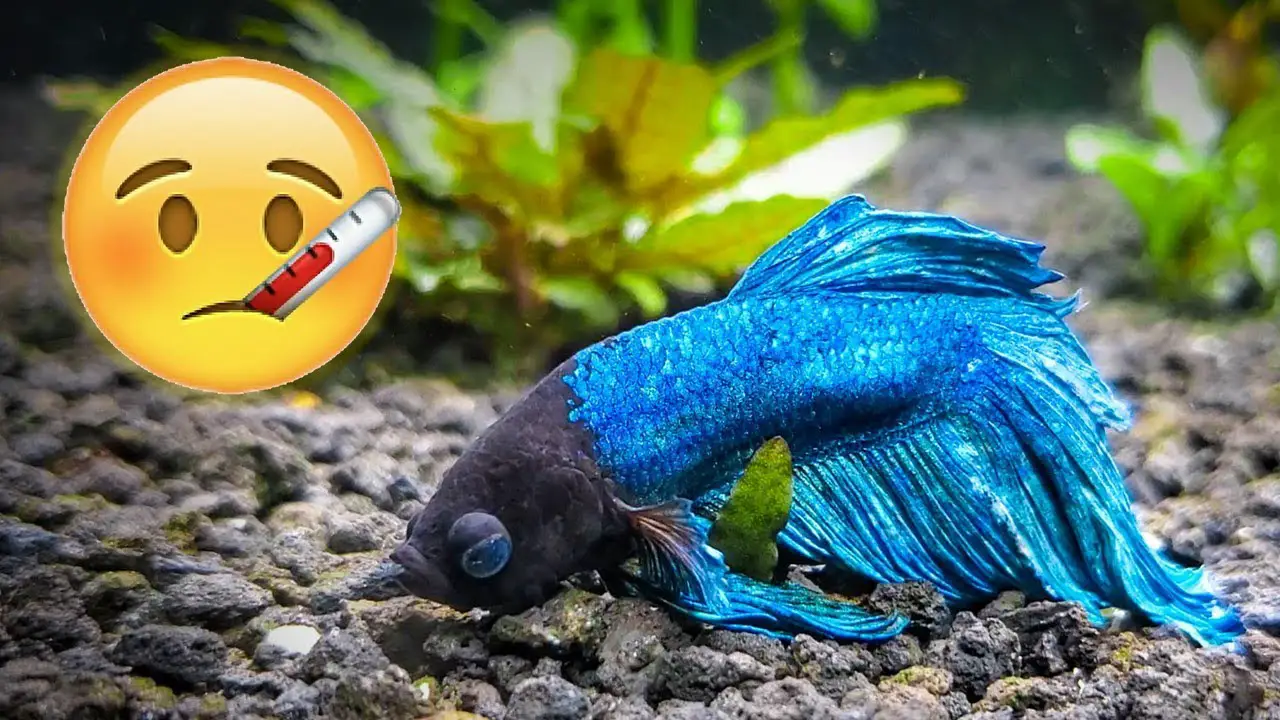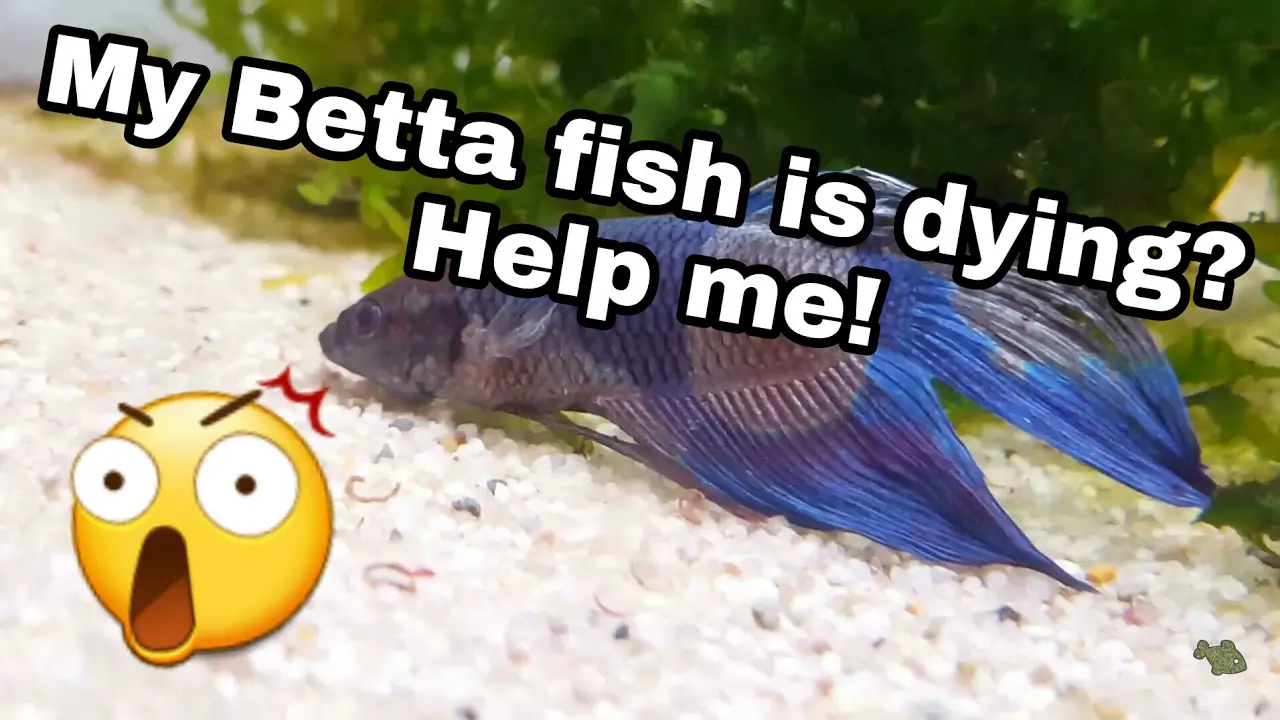Betta fish, also known as Siamese fighting fish, are a popular choice for aquarium enthusiasts due to their vibrant colors and unique personalities. However, these beautiful creatures can become sick or even die if not properly cared for. It can be distressing to witness a betta fish suffer, but there are steps you can take to help save its life.
In this article, we will explore the common signs of a dying betta fish and provide tips on how to revive your beloved pet. With a little bit of knowledge and effort, you can help your betta fish recover from its illness and live a happy and healthy life.
If you notice your betta fish is lethargic, not eating, or has clamped fins, it may be dying. First, test the water quality and temperature of the tank. Ensure the water is clean, warm, and has the proper pH levels. You can also try adding aquarium salt or medication to the water. Change the water frequently and provide a healthy diet. If these measures fail, seek advice from a veterinarian who specializes in fish care.

How to Help a Betta Fish That is Dying?
Betta fish, also known as Siamese fighting fish, are one of the most popular aquarium fish due to their beautiful colors and graceful movements. However, if they are not properly taken care of, they can fall ill and even die. If you notice that your betta fish is not swimming as actively as before, has lost its appetite, or its color has faded, it may be an indication that your fish is dying. In this article, we will discuss ways to help a betta fish that is dying and how to prevent such situations from occurring.
Identify the Symptoms of a Dying Betta Fish
The first step to help a dying betta fish is to identify the symptoms. Some common signs of a dying betta fish are:
- Loss of appetite
- Lethargy
- Gasping at the surface of the water
- Fading of color
- Clamped fins
If you have noticed any of these symptoms in your betta fish, it is essential to act quickly to save your fish.
Check the Water Parameters
The water parameters in your betta fish’s aquarium play a crucial role in its health. Make sure the temperature of the water is between 76-82 degrees Fahrenheit as betta fish are tropical fish and thrive in warm water. The pH level of the water should be between 6.5-7.5, and the ammonia and nitrite levels should be at zero. You can use a water testing kit to check these levels.
Change the Water
If you notice that the water parameters are not optimal, it’s time to change the water. A partial water change of 25-50% every week is recommended for betta fish. However, if your fish is sick, you may need to change the water more frequently. Make sure to use a dechlorinator to remove any chlorine from the tap water before pouring it into the aquarium.
Adjust the Diet
A healthy diet is essential for betta fish. If your fish is not eating, try offering it a variety of food such as pellets, frozen or live food like brine shrimp or bloodworms. However, if your fish is constipated or bloated, you may need to fast it for a day or two and then offer a small amount of food.
Use Medication
If changing the water and adjusting the diet do not improve your fish’s health, you may need to use medication. There are several medications available for betta fish, such as antibiotics, anti-fungal, and anti-parasitic medications. However, it is essential to consult with a veterinarian or a fish expert before administering any medication to your fish.
Isolate the Sick Fish
If you have other fish in the aquarium, it is essential to isolate the sick fish. This will prevent the spread of any disease to the other fish. You can use a small quarantine tank or a plastic container with clean water and an air stone for oxygen.
Provide a Comfortable Environment
A comfortable environment is crucial for a betta fish’s recovery. Make sure the aquarium has plenty of hiding places like plants, caves, and rocks. Also, ensure that the water is clean and free of any debris or uneaten food. A clean and comfortable environment will help your fish recover faster.
Preventive Measures
Prevention is always better than cure. To prevent your betta fish from falling sick, make sure to provide a healthy and clean environment, feed it a balanced diet, and avoid overcrowding. Regular water changes and water testing are also important to maintain a healthy aquarium.
When to Seek Professional Help
If your betta fish is not responding to the above measures or if the symptoms are severe, it is essential to seek professional help. A veterinarian or a fish expert can diagnose the problem and provide the appropriate treatment.
In conclusion, a dying betta fish can be saved if proper care is taken. Identifying the symptoms, checking the water parameters, adjusting the diet, using medication, isolating the sick fish, providing a comfortable environment, and taking preventive measures can help your betta fish recover from illness. Remember, prevention is always better than cure, so take care of your betta fish to keep it healthy and happy.
Frequently Asked Questions
Here are some frequently asked questions about how to help a Betta fish that is dying:
1. What are the signs that my Betta fish is dying?
If your Betta fish is dying, you may notice a decrease in activity level, loss of appetite, lethargy, and discoloration. In some cases, you may also notice physical symptoms such as fin rot, bloating, or difficulty breathing. If you suspect that your Betta fish is dying, it’s important to act quickly to try to save it.
One thing to keep in mind is that Betta fish are very sensitive to changes in their environment, so it’s important to monitor the water temperature, pH levels, and water quality in their tank. Any changes in these factors could be contributing to your Betta fish’s decline in health.
2. How can I revive my dying Betta fish?
If you’re trying to revive a dying Betta fish, there are several steps you can take. First, try to improve the water quality in their tank by doing a partial water change and adding a water conditioner. You can also try adding aquarium salt to the water to help with any bacterial infections or parasites.
You should also consider adjusting the temperature in the tank and making sure your Betta fish has access to plenty of oxygen. You can do this by adding an air stone or adjusting the water flow in the tank. Additionally, you may want to try feeding your Betta fish a high-quality, nutrient-rich diet to help boost their immune system. Keep in mind that it may take some time for your Betta fish to recover, so be patient and monitor their progress closely.
3. Can stress cause a Betta fish to die?
Yes, stress can definitely contribute to a Betta fish’s decline in health and even cause them to die. Betta fish are very sensitive to changes in their environment, including changes in water temperature, water quality, and lighting. They can also become stressed if they are housed with other fish or if their tank is too small.
To reduce stress in your Betta fish, it’s important to provide them with a clean, comfortable environment that meets their needs. This includes monitoring the water quality and temperature, providing plenty of hiding places and plants in the tank, and ensuring that they are not housed with any aggressive tank mates.
4. What are some common diseases that affect Betta fish?
There are several common diseases that can affect Betta fish, including fin rot, ich, velvet, and dropsy. Fin rot is a bacterial infection that causes the fins to deteriorate, while ich and velvet are parasitic infections that can cause discoloration and lethargy. Dropsy is a condition that causes the fish to become bloated and swollen.
If you suspect that your Betta fish has a disease, it’s important to quarantine them immediately and seek treatment from a veterinarian or experienced fish keeper. Treatments for these diseases may include antibiotics, anti-parasitic medications, and water changes.
5. How can I prevent my Betta fish from dying?
The best way to prevent your Betta fish from dying is to provide them with a clean, healthy environment that meets their needs. This includes monitoring the water quality and temperature, providing a proper diet, and ensuring that they have enough room to swim and hide in their tank.
You should also avoid overfeeding your Betta fish and make sure to clean their tank regularly. Additionally, it’s important to avoid housing them with aggressive tank mates or putting them in a tank that is too small. By taking these steps, you can help ensure that your Betta fish stays healthy and happy for years to come.

Top Tips For Curing Your Sick Betta Fish!
In conclusion, helping a betta fish that is dying can be a challenging and emotional experience. However, with the right knowledge and tools, it’s possible to nurse your fish back to health.
First, it’s important to identify the cause of your betta fish’s illness. Common causes include poor water quality, overfeeding, and disease. Once you’ve identified the cause, take steps to address it promptly.
Next, focus on providing your betta fish with the best possible care. This may include water changes, medication, and a proper diet. Be sure to monitor your fish closely and make adjustments as needed.
Finally, remember that prevention is key. By maintaining a clean, healthy environment for your betta fish and providing proper care, you can help prevent illness and ensure a long and happy life for your beloved pet.
